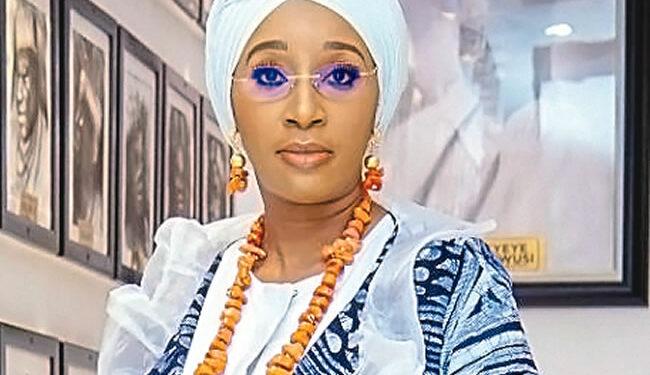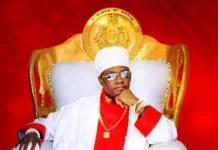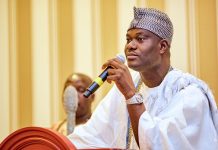
Olori Ronke Ademiluyi was born into royalty, her great-grandfather was Ooni Ademiluyi, so finding herself in the palace as a wife of the Ooni of Ife, Oba Enitan Adeyeye-Ogunwusi is back to base. In this interview by Tunde Ayanda, the soft spoken beauty who studied Law but chose fashion above all other things discussed her role in the palace, polygamy and how she became a wife to the Ooni of Ife. Excerpts:
What was your childhood like?
I had a very privileged background as one of the children of Prince Adebolu Ademiluyi. I have three brothers, and I’m the only girl. I was born in London, precisely the Paddington Hospital where the royals in the UK are born as well. I lived in Sussex Garden while growing up before we moved back to Nigeria. I did a bit of my schooling in Nigeria; my primary school was Adrao International School and then my mum, who is from Akure, and they decided that we should go over there to also learn from her people. So I was in boarding School at Fiwasaye Girls Grammar School, Akure. I went back to London for my A’Levels; later, I went to London University where I studied Law, despite always wanting to spend all my life in fashion and textiles.
How did you marry the Kabiyesi and what is the attraction?
I can tell you I fell in love with him because of our culture, for the upliftment of our culture.
In a royal setting in Africa, king usually has many wives and Kabiyesi exercised this recently by marrying you and five other wives, how do you cope?
First and foremost, I must say polygamy is part of the African culture. If you look at all the Oonis, from Ooni Oduduwa, they all had many wives, even my great grandfather, Ooni Ademiluyi had 47 wives. It comes with the throne and its part of the throne, polygamy is an African culture and part of the throne of Ile-Ife. My husband’s predecessor, Ooni Olubuse had 11 wives, that›s the culture.
What’s the usual life in a Palace for an Olori?
My great grandfather was Ooni Ajagun Ademiluyi, he was the 48th Ooni of Ife, so I’ve always been used to royalty, and I’m a blue-blood. I’ve always known everything about the palace and royalty. Now that I’m married to the 51st Ooni of Ife, for me it’s just normal because it’s something I’ve always been used to. Waking up with duties, doing my work as well, doing my cultural duties, bringing everything together is just something I do effortlessly, because I’ve been used to it from a tender age. When His Majesty ascended the throne in 2015 I had that opportunity to be a part of the whole thing, so I’m kind of grown with him and he is being someone like a mentor, he mentors me a lot.
How did you adjust to life in Ile-Ife compared to city life in Lagos? Did you miss anything?
To be honest, I don’t really miss anything because I don’t like the traffic in Lagos. We all know how hectic Lagos can be. Living here is more like an escape from the Lagos life. I have my work that I do here as well, His Majesty established an adire factory for me where we make adire and train people. We work with students from the universities. For me it’s another life aside from the one in Lagos.
Why did you study Law?
Fashion wasn’t lucrative when I was growing up, so I wasn’t allowed to study fashion. Fashion then was frowned at. They see it as the lowest for those who are not intelligent, unlike now where African fashion is now a huge thing. I’m in love with western designs but I look into Africa for inspiration. They call it ethnic fashion, tribal fashion, African fashion, there is no name they haven’t given it, but the bottom line is that it is African. Africa has like 3000 tribes and each tribe has its own unique fashion culture. No matter how close your borders are, when you see kente on someone you know maybe this person is from Ghana. In Nigeria, we have about 500 ethnic groups and we have our different fashion. Regarding African fashion, I think we are still scratching the surface, we haven’t started yet. My mum’s sister that I stayed with was a retired Judge, so I used to go to court with her, it was from there that the inspiration came to study Law, but I never practised, after studying Law, I went straight into fashion.
Why did you take the African Fashion Week to Brazil this year?
We decided to take it to Brazil because I’ve been going to Brazil with His Imperial Majesty since 2018. Brazil and Nigeria have so many things in common, they are the two most populous black countries in the world and then about 90 million Afro-Brazilians are of Yoruba ancestry, they see themselves as Yorubas and they practise the Yoruba culture and also the ‘Isese’ religion. They see His Imperial Majesty, the Ooni of Ife as their own king and the physical representative of Oduduwa.
Taking the African Fashion Week to Brazil is just like fitting into a jigsaw puzzle because it was expected there.
What are the duties of a Cultural Ambassador and the custodian of the Moremi Ajansoro legacy?
I’m the Vice Chairman of the House of Oduduwa, the Ile Oduduwa. His Majesty is the Chairman and I am the Vice-Chairman. I’m the cultural ambassador of the legacy of Queen Moremi Ajansoro, I’m also the cultural ambassador of the Ayan-Agalu Drum Festival of His Majesty as well.
As a cultural ambassador, it’s my role to come up with strategic development and enhancement of whatever project that I’m doing. For instance, with the Moremi initiative, as I’m the global ambassador, it’s my role to come up with so many projects that will keep the legacy of the legendary Queen Moremi going. So, we have the Moremi Cultural and Leadership Pageant, we have the Moremi Initiatives where we support the rights of women in Nigeria and we also have the Moremi Education Fund where we provide funds for girls to go to school. We have the Moremi Say No To Trafficking, where we help the victims of modern day slavery back into the society and all these are supported by His Imperial Majesty who is the Chairman of the House of Oduduwa. Similar with the drum festival as well, last year we had the Ayan-Agalu drum festival in Ile-Ife, we are having it again this year and it›s in partnership with the Drum Festival in Canada. So, my role is to come up with strategic alliances and developments in enhancing whatever project or deity that I am the custodian of.
Recently, you published a book, ‘Unspoken; Oba Obinrin’, the title looks unusual, what message were you trying to pass with the book?
I got deeply rooted into culture in 2015 when His Majesty ascended the throne as the Ooni of Ife. He carried me along and exposed me to a lot of cultural things that I didn’t know before. It was while I was doing my research as the cultural ambassador of Queen Moremi that I came across the story of the female Ooni of Ife, Ooni Luwoo. Then I asked His Majesty if Ooni Luwoo was the only female king among the Yorubas and he said there were other female Yoruba kings in other towns as well. So, I started my research and I found out that we had so many Yoruba female kings contrary to what they put out there that female cannot become king in Yoruba land. It was based on that information that I decided to write the book and call it Unspoken because while I was doing my research a lot of people did not know that we had women who had reigned as kings in Yorubaland, that’s why I gave it the title because that wasn’t spoken about in history. It was also to be used as a reference point for young girls and women of nowadays who want to go into leadership, so they can see what the ancient women of old did with leadership and also being wives and mothers. So if you are a woman, a wife or mother, nothing should stop you in whatever role you want to play, in politics, private or public sector. The book is just like a guidance and inspiration.
You are in the creative industry, what do you think the government can do to improve the industry?
I think the President should continue supporting the industry. I remember in 2016 when I went to President Bola Tinubu (he was then the Lagos State Governor), so I went to explain the initiatives of the African Fashion Week Nigeria and immediately he supported it and also reached out to those who could support it because he believed in the creative sector. He knows the development a nation can gain from small medium enterprises and if you look at the hair industry, the makeup industry, music industry, the fashion industry, you can see that the value chain can help us grow our GDP tremendously.
What are you doing to sensitize other palaces and make them see the reason Yoruba culture and values must be protected by all means?
In March this year, myself and another Olori set up a conference of Oloris where we had almost 200 Oloris in the Southwest coming together to the palace to celebrate Women History Month and then we talked about different things, our special guest was the wife of the Governor, Her Excellency Ngozi Adeleke. We talked about things within our different communities, the similarities within our culture, how we can support each other and work together. But most of all, Ile-Ife is the cradle of the black race, you know I talked about 90 million people who are Afro-Brazilians and see themselves as Yorubas. The Yoruba people across the world are almost 300 million, so what His Majesty is trying to do is to position Ile-Ife as the spiritual home of all the Yorubas. Christians go to Jerusalem on pilgrimage, Muslims go to Mecca on pilgrimage, we want the Yoruba people across the world, in Cuba, Trinidad and Tobago, the Caribbean, South America to come to Ife and see it as their own spiritual home and that is why we are trying to position Ile-Ife as the spiritual home of the Yorubas and my husband is doing a great job. The Olojo Festival is there where we have millions of people in attendance to see their prestigious, ancient ‘Aare crown’ that comes out once in a year.
There is a change in your dressing, as a Queen, are there some clothes you are forbidden to wear?
My position comes with my appearance as the wife of a king; you can be called at any time to do anything, so you must keep up that appearance because you are representing your husband wherever you are. If you are dressed in jeans or not dressed in a proper way it would have an adverse effect, people will start talking. People would feel that being a princess, I’m supposed to know better.
For someone who had given a lot to fashion, what has fashion given back to you?
Fashion has given me a lot. I showcased about 2,000 designers from about 26 African countries and I have been the success story of the most emerging and successful African designers. For me I’m happy, I’m fulfilled when I listen to testimonies of what others have been able to gain from what I started. Fashion has given me fulfilment and it will continue giving me.
Your store Rukiz in Lagos was popular then with the high-heeled and the most urban, what happened to the business?
Rukiz was a chain of stores I had when I moved back to Nigeria in 2001, it was actually Rukiz that exposed me to the fashion industry. When I was in school in London, I used to do a little bit of fashion but after my studies, I decided to move back to Nigeria and that was when I established Rukiz. I had a chain of five stores, two on Opebi, one in Surulere, one in Lekki and one in Lagos Island, they were all doing well, but when I decided to move into African fashion industry, I decided to close Rukiz because I couldn’t get a proper management structure. With the African fashion, I was all over, I was in the UK and around different African countries. So, the management of Rukiz stores was lacking and that was why I closed it to focus on African Fashion.
I started African Fashion Week in London in 2011. African fashion wasn’t popular then and people were like why do I have to call it that, I was advised to change the name but I went with my gut-feeling and established the African Fashion Week London. The venue we took then could only accommodate 700 people, but we had a turn-up of 4,500 people and that was when I knew the world is hungry for African fashion and it has been growing since then and this has inspired so many African fashions around the world. There is hardly any city in the world that doesn’t have an African Fashion Week which was based on the success I achieved.
Kindly contact us @ Naijalivetv@gmail.com
Call or Whatsapp: 07035262029, 07016666694, 08129340000










